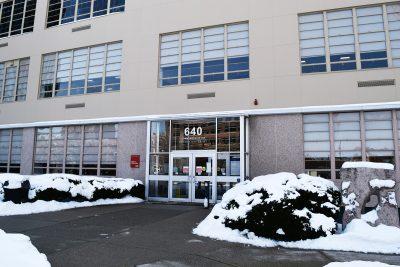In mass communications, storytelling is a universal, effective tool in spreading meaningful messages. And telling all kinds of stories, with empathy and dignity, elevates the entire medium.

Boston University’s College of Communication hosted the “Storytelling For Social Good” panel Wednesday to highlight three alumni’s contributions to social change in their creative fields.
Aimee Segal, who graduated from COM in 1994, is the director of strategic initiatives and programming at United States Holocaust Memorial Museum. Segal said working in the museum not only allows her to converse with a diverse audience, but also allows her to greater appreciate democracy.
“The greatest opportunity that I feel I’ve gotten in working at the museum is every day, I get a chance to learn more,” Segal said at the event. “We value our freedoms, and we value in a liberal democracy this idea of respect and the dignity of all individuals, and that is certainly something that we can take as warning from this history.”
Lauren Beader, a 2015 COM aluma, is the founder and president of AllWorthy, Inc. — a nonprofit that works to normalize conversations about disabilities and foster inclusivity.
Beader said the inspiration of her nonprofit comes from her adopted cat, Maya, who has a chromosome abnormality, who she introduced at the event to the virtual crowd.
She said she created an Instagram account for Maya that gained popularity.
“Her story just went everywhere,” Beader said at the event. “We have no idea how, but because of that people asked us to make an Instagram, so we did, and then it just kept growing.”
When asked about the role of social media in storytelling for social good, Beader described it as “in a quick digestible moment, humanizing a problem and a solution.”
Beader said once they had this platform, they wanted to use it to create impactful change around the discussion of disabilities as a whole.
“Because we had this platform, we thought ‘we want to do something more with it.’” Beader said. “We have created this nonprofit as a means of helping kids and grownups to accept one another, and just starting the conversation about disability and inclusion.”
Beader said her nonprofit — which has put out a children’s book about Maya, onesies, t-shirts and other merchandise — has raised over $20,000 for causes related to disability inclusivity.
“It’s just been just a really cool way of bringing our pets, and our passions together,” she said at the event, “and really making an impact.”
Scott Cameron, a panelist at the event and a COM ’92 alumnus, is the executive producer of International Social Impact at Sesame Workshop.
While pursuing his graduate degree at Columbia Teachers College, Cameron said he interned at Sesame Street International and fell in love with how it approached storytelling.
“From that point on, I was just in love with the work they did,” Cameron said in an interview, “because it leads with joy.”
Among Sesame Street’s social impact initiatives, Cameron said one of his favorite moments was conducting a muppet training workshop in Amman, Jordan to create Ahlan Simsim, a project funded by the MacArthur Foundation.
“We were designing a new Sesame Street that would work to help children and families who are affected by the Syrian refugee crisis,” he said.
To do this, he said the show strived to find people from Syria to be puppeteers in the cast, which was a difficult task. When they did find someone, he said it was a powerful moment.
“There was a moment during our training when we found this fantastic man who brought one of our characters to life.” Cameron said in an interview. “There was just this very moving moment, where all of us on the Sesame team looked at one another … and it was really moving.”
Cameron said he thinks he has “brought a sense of playfulness and humor to work that can be quite emotionally demanding,” but it’s worth it to educate children about these issues in an engaging way.
Cameron said his upcoming project with Sesame Street is about refugees in Rohingya, which is funded by the Lego Foundation.
The most important skills he said he learned from his undergraduate studies are not technical but rather philosophical, which are still relevant to his storytelling career today.
“The skills that have come in handy most are having a wide frame of reference,” Cameron said. “Knowing how things connect, how artists connect to politics, how artists connect to history … all of those things are our frames of reference that come in handy every single day.”
The panelists’ experience highlighted the role empathy plays in storytelling at home and abroad, Beader said in an interview.
“All the advertising and nonprofit work in general relies on empathy,” Beaker said. “Our job as advertisers or storytellers is to help people understand another perspective and it’s not just educating about that perspective, it’s understanding.”



























































































































